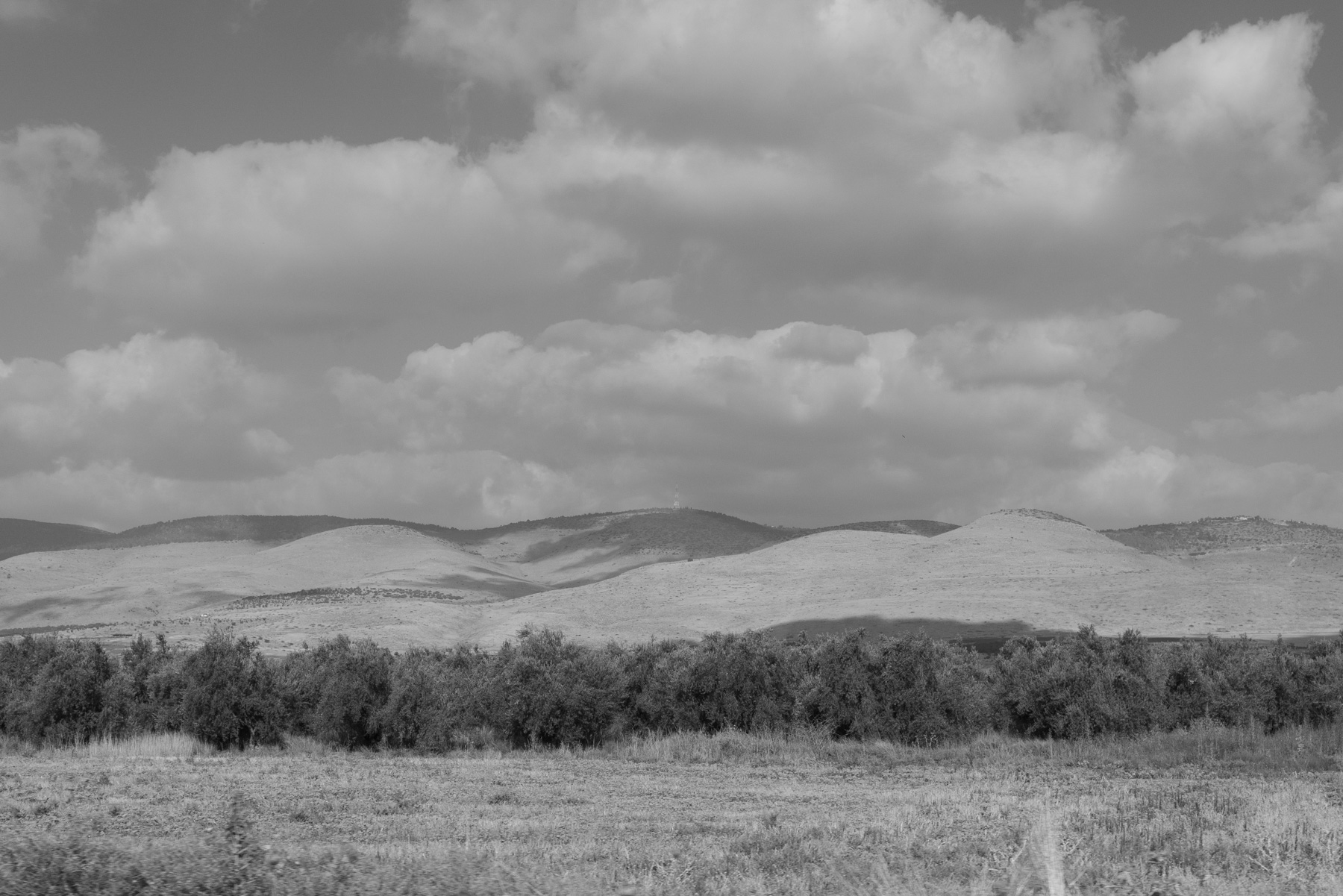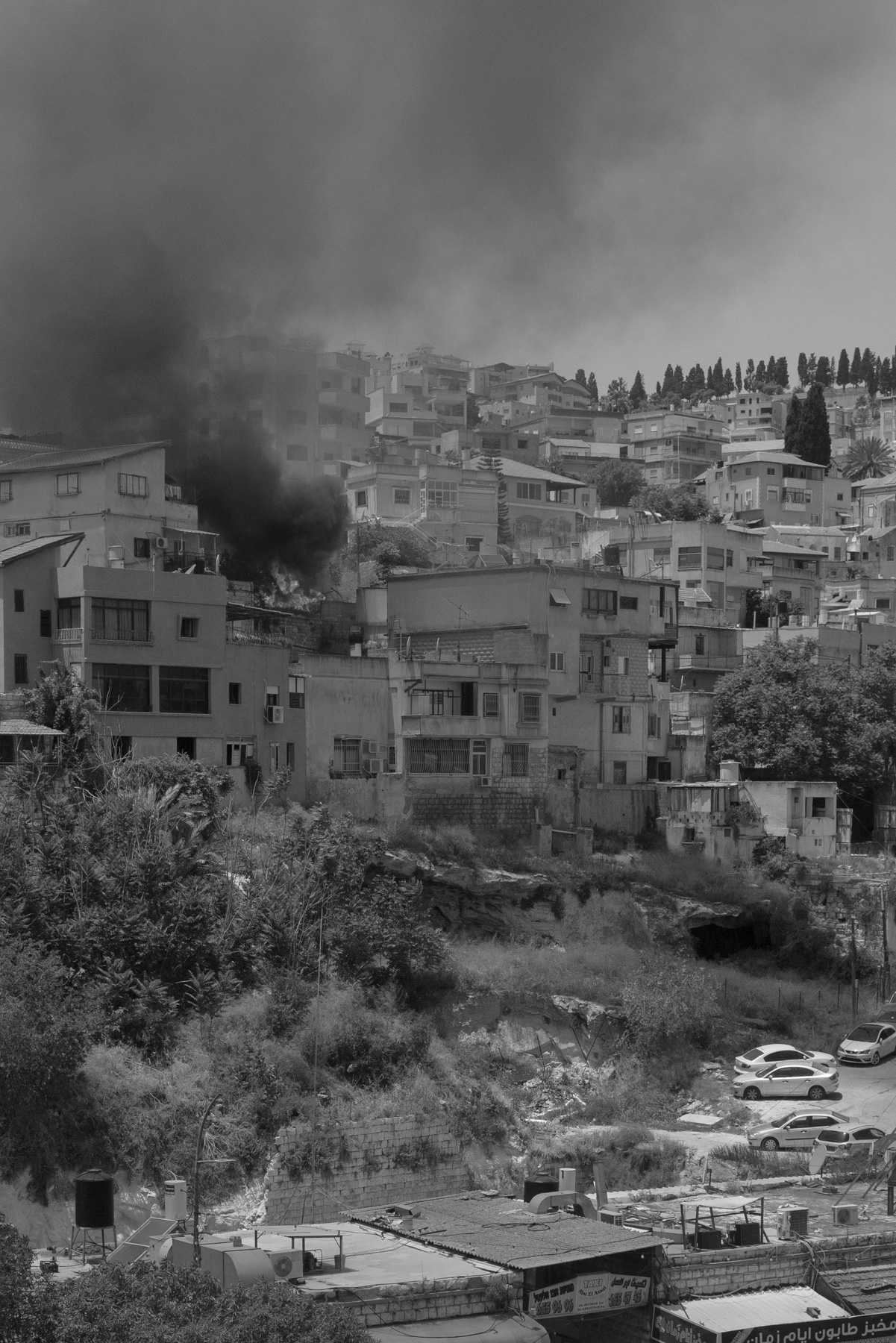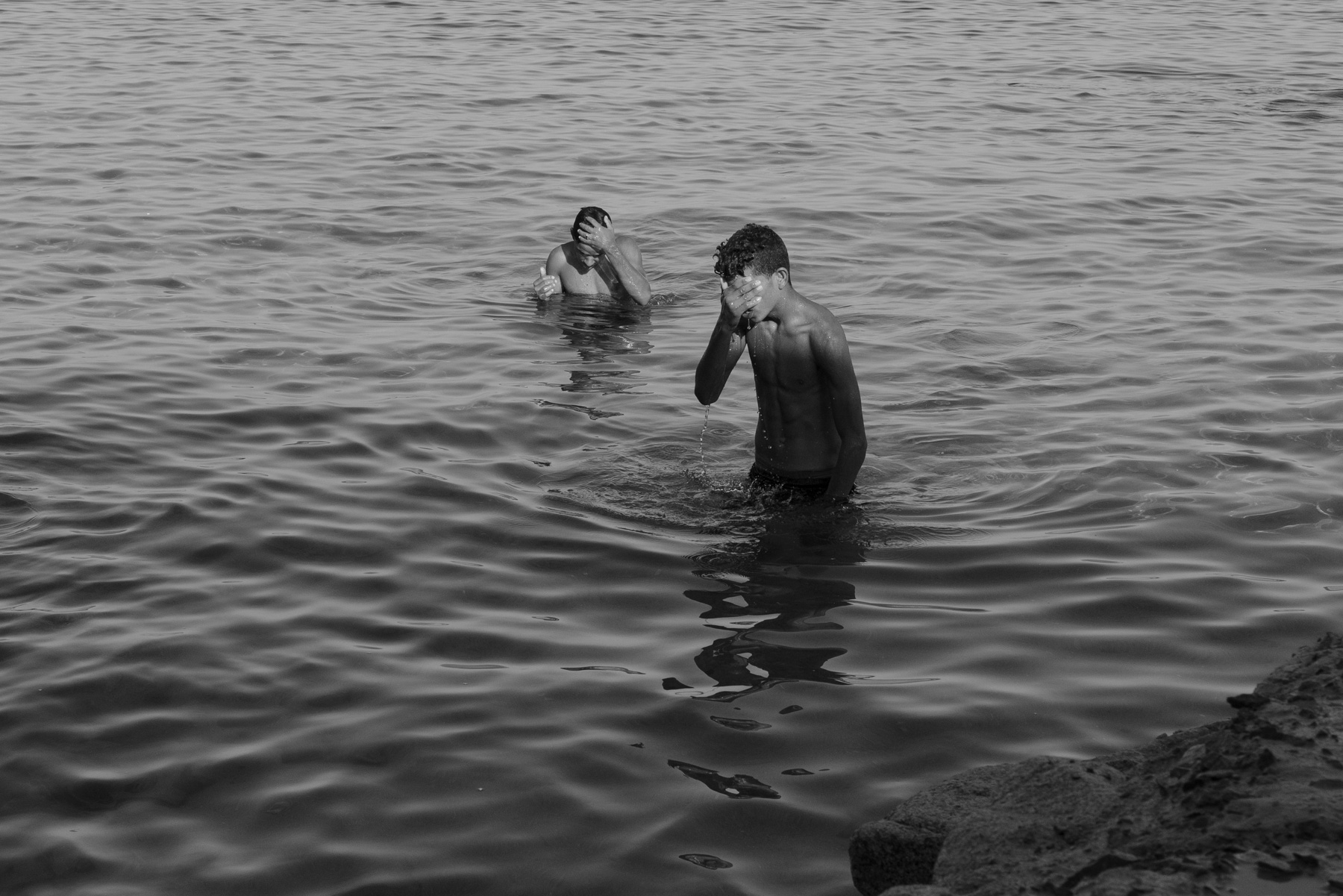
Inheritance
A Story in Three Chapters
By Nabil Harb
Both of my parents are Palestinians whose families come from different parts of our diverse society. My mother’s family is and always has been from Nazareth. They are well-educated city folk who kept diaries, wrote and published books, drove cars, and meticulously recorded their lineage on a family tree. The city of Nazareth stands out in the contemporary history of Palestine because, thanks in part to the last-minute decision of a Canadian-Israeli commander in the Israeli Occupation Forces, it was not depopulated during and after the Nakba in 1948. Many other Palestinian villages and cities suffered a much worse fate, becoming the sites of massacres and mass-expulsions when Zionist forces invaded. Word spread about Nazareth’s unique circumstance and many Palestinians fled to the city, and this is how my father’s family arrived to Nazareth. Hailing originally from the village of Silwad in what is now known as the West Bank, my grandfather left behind more than half of his family and brought my grandmother and their children to this safe haven. The Silwadi side of my family was not educated in the traditional sense, having always preferred the lessons taught by a scrape on the knee, the swift kick of a donkey, or the sting of a nettle improperly removed from the garden. Their stories about one another and our lineage are shared in huddles outside over coffee or at dinner with the extended family. A chunk of lamb flies from my uncle’s mouth as he’s telling me about the Israelis who wouldn’t pay him for his work in 1988 or how his cousin beat him up over a girl in 1967.
I’ve been writing my own record of the stories and experiences shared with me by my father and others from his side of the family. This short story here is part two in a series of three installments for Three Fold, where I delve into particular moments in our family’s history, accompanied by photographs made during my last extended trip to our homeland in 2018. These stories jump across time to consider the cleaving and suturing of our communities and our lands, bringing a wider historical scope to the history of our people. I want to think about how, in defiance of all the forces meant to eradicate and contain us, we always return to our landscape and to one another.

Chapter Two
1936
My grandfather Ahmad witnessed a home demolition for the first time at the age of eighteen. This would, of course, become a regular and widespread scene in Palestine, repeated over and over in his lifetime, but this was his first.
Ahmad had been conscripted to drive trucks for the British Mandate only months prior and was on a break in Yaffa wandering the town in search of a place to eat when he happened upon this demolition. He joined a growing group of shocked onlookers, this being a new sight for them too, as the matriarch of the family wailed, bags at her feet and holding her infant son. Her husband held her shoulder in one hand and his own face in the other, as she cried out to the British Army, begging them to stop. “We pay what you want, We pay what you want,” Ahmad recalls her begging in broken English, her voice growing weaker and quieter, her tone shifting from protest to grief. “Please don’t take our home.” Their daughter, no older than three, watched her mother plead to a cold and uncompromising force, looking back at her crumbling home as she tried to understand what was happening.
Everyone was trying to understand. This nightmare playing out in front of them was a new phase in a colonial process that had yet to be fully grasped by the people of Palestine. As British administrators continued to sign away the Palestinian’s fate from across the globe, the British soldiers on this block in Yaffa peeled off the facade of the building to expose the strangers’ two-story home. The crowd watched in a helpless daze as a couch and cabinet spilled from the second-floor living room and the family’s belongings fell out onto the road, breaking into pieces before them. Documents, cutlery, clothing, heirlooms, and toys scattered around the street; the intimate world they once shared was ripped open for all to see. As the soldiers tore into the bedrooms, clean white linens flew from closets and floated in the dusty air above the road. Cars stopped; the drivers removed their sunglasses revealing furrowed brows and passengers hung out their windows with mouths agape. In no more than twenty minutes, the material of a family’s life was laid bare, destroyed. My grandfather did not know these people, but as he stared at his own reflection in the shards of their dinner plates at his feet, he thought to himself, “I know them now.”
But this family did not know Ahmad. The people who knew him were in his home of Silwad and if you asked them, they’d tell you about how Ahmad was known and loved around the village for his even temperament and the jokes he would tell in soft tones, cigarette in hand, off in the corner of the gathering while another member of the family was holding court. He was well-liked by the British commanders who managed his routes. He was an amenable and reliable truck driver where other Palestinians from rural areas, new to vehicles altogether, were having difficulty. Ahmad took to it quickly in those early years, when it was not uncommon for an entire truck to overturn and lose all its cargo, oftentimes construction materials like cement, which, aside from being a waste of money, posed a particular challenge when it came time for clean-up.
By this point, the British were decades into expanding the infrastructure within the British Mandate to modernize the commercial pathways established by the Ottomans. Rural Palestinians and Bedouins had their farming lands minced and fragmented, losing most of their livelihoods to accommodate these new roads. Economic opportunities were disappearing all around Ahmad, so he resigned himself to dutifully and diligently traversing the fresh cuts across the land.
After witnessing this demolition, Ahmad bought a couple oranges from a street vendor nearby and hit the road heading east. Driving gave him time and space to think. While on the road, he dreamt of having his own family in Silwad and visualized the piece of land that he would inherit upon marriage. He thought of the garden and flower beds his mother and father tended to so dearly, and how the soil of Silwad could nurture anything he would want to grow. He knew with certainty that he would plant a cactus specifically for the fruit, sabr in Arabic, that it would bear. The thought of tearing the barbed outer skin to reveal the tender and watery flesh, peppered with seeds as hard as little rocks, excited him. The aroma that rewarded he who made it past the thorny barrier was floral and faint, a hybrid of watermelon and sweet rose. He would show his new wife his special technique for avoiding the seeds and extracting the delicate fruit, using his teeth and tongue to sift through his bite, for fear of ending up like his cousin with a splintered molar. He remembered how the tooth bled so much, and his cousin cursed to the sky with pain. Wincing from the memory, he ran his tongue across his teeth, performing a quick inventory.
Ahmad rid the image from his mind, grabbed an orange rolling around in the seat next to him, peeled the skin, and began to eat. The fresh Yaffa citrus perfumed the truck’s cab and his mouth tingled from the acid. A pucker formed, starting from the back of his jaw and moving over his lips. Eyes fixed on the road and fingers tacky from the juice, Ahmad attempted to remove a veiny shred of pith lodged in his teeth, to no avail, when it occurred to him that he’d love to have his own orange tree as well. Orange groves were not as common in Silwad, and he knew that if he wanted good citrus, he would need to look for them in Yaffa.
Three weeks later Ahmad found himself there for work again, but things felt different this time. The city truly had it all: It boasted a rich mix of agricultural sectors and urban squares, framed by a beachfront lifestyle. Within only a few blocks, you could raise a grove, harvest the oranges, process the fruit, and enjoy a glass of freshly-squeezed juice by the sea. This was a quintessential experience for land-owning Palestinians in Yaffa, but it was beginning to change.
A year prior, in 1935, a shipment of machine guns and ammunition hidden in cement crates had been uncovered in the port of Yaffa. Sent by an anonymous Belgian supplier, it had been originally destined for the Haganah when it was discovered by Palestinian dockworkers and reported to their British bosses. Word spread quickly, and Palestinians across the territory began protesting in reaction to the growing underground Zionist movement and their plans to take over the British Mandate of Palestine. Laborers in Yaffa had recently organized an economic strike and the British government responded with harsh and sometimes violent punitive measures. Agricultural lands, notably orange groves, were confiscated as punishment. And for the first time, home demolitions were introduced by the British to the region as a way to deter resistance, to make a clear example of what was to come. This was how a family in Yaffa lost their home that day, while my grandfather and others watched silently from the street.
When Ahmad returned, seeking the street vendor from whom he had purchased oranges previously, the man and his cart were nowhere to be found. He walked around the corner to a café to inquire about this fruit seller and was informed that the man’s brother, his supplier, had lost his grove weeks prior. Ahmad was struck upon learning that the oranges he purchased that day were some of the last the vendor would sell.
“If you still want good oranges from an Arab,” the owner of the café said, as he scribbled an address on a piece of paper, “go see Awni down the street, tell him I sent you.”

An older woman answered Ahmad’s knock at the door when he arrived at a small house on a side street. She saw my young grandfather in front of her and turned to call for someone in a room behind her. As she receded into the home, Awni appeared from the back. He was a young man, around 25 by Ahmad’s estimation, but from a teenager’s standpoint he seemed much older. He was broad chested and proud as he offered Ahmad a cigarette while flicking the end of his own and lighting another. He confidently explained how, along with two of his cousins, he had recently developed a smuggling operation to get Yaffa oranges distributed and sold among other Palestinian families from groves recently seized.
The Palestinian strikes incurred a reaction from the British, which then beget another more illicit response from laborers. Moving in the dead of night, these smugglers would collect low-hanging fruit from the trees to make the least noise. Their familiar groves now seemed different at night under these circumstances; what was once their pride had become their secret. Their aim, as Awni described, was to “keep things as they were,” to keep the impacted families from losing everything at once, and to help fuel the ongoing strike against the Zionists and the British. “Those trees belong to us,” he emphasized. “All of this is ours and it always will be … before the Brits, before the Turks …” The young man jumped between related topics with eyes focused. Awni could see the other side so clearly, and sincerely believed that victory over the colonial system was possible. After his diatribe concluded, he took Ahmad to his bedroom.
Ahmad was amazed to see the stacks of crates, each full to the brim with oranges dizzily balanced atop one another, among Awni’s things. He described the legacy of the grove they originated from and the family who had owned it. He offered one to Ahmad, who closed his eyes and mashed the pulp in his mouth. It did not disappoint. He knew right then that he needed to take some of these underground oranges to Silwad. And suddenly, a new kind of economic opportunity appeared before him. After a bit more conversation and not too much convincing, it was decided that Ahmad, in exchange for a free crate for himself, would conceal and discretely transport ten crates of oranges in his British Army truck to a village called Birzeit.
What began as a one-time deal became a regular business arragement between Ahmad and Awni. Cash payments were included, as well as his complimentary oranges, something Ahmad insisted on. He became the most productive smuggler in the eastern region of Awni’s swiftly widening operation. His good standing as a truck driver afforded him further discretion; he could fly under the radar for a while. Silwad and the surrounding area were suddenly flush with these illicit oranges and they became a much-bragged about talking point on the fruit plate brought to guests after dinner with tea.
Ahmad did get his Yaffa orange tree, and soon raised a little huddle of them for himself and his family. The dewy air of the mornings held the sweet smell of citrus blossoms as he walked around the back of his house. Ahmad inspected his garden with its recent additions and a sense of satisfaction washed over him. This was something to be proud of, he thought to himself. Things would certainly change, but for now he was making do, managing to start a life for himself in a way that felt closer to thriving. He couldn’t wait to show his future wife, whoever she may be, his precious new trees.
Nabil Harb (b. 1992) is a Palestinian American artist born and raised in Central Florida.
Read Inheritance, Chapter One by Nabil Harb
Read Inheritance, Chapter Three by Nabil Harb
Lead image: Outside of Tur’an, 2018
Fig. 2: Fire in Nazareth, 2018
Fig. 3 Swimmers, 2018
Read next: Imaginary Dinner Party, Part Thirteen by Lynn Crawford